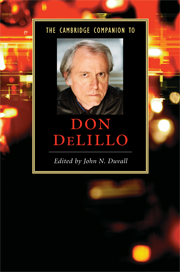Book contents
- Frontmatter
- Introduction: The power of history and the persistence of mystery
- PART I AESTHETIC AND CULTURAL INFLUENCES
- 1 DeLillo and modernism
- 2 DeLillo, postmodernism, postmodernity
- PART II EARLY FICTION
- PART III MAJOR NOVELS
- PART IV THEMES AND ISSUES
- Conclusion: Writing amid the ruins: 9/11 and Cosmopolis
- Select bibliography
- Guide to further reading
- Index
- Series List
1 - DeLillo and modernism
from PART I - AESTHETIC AND CULTURAL INFLUENCES
Published online by Cambridge University Press: 28 June 2008
- Frontmatter
- Introduction: The power of history and the persistence of mystery
- PART I AESTHETIC AND CULTURAL INFLUENCES
- 1 DeLillo and modernism
- 2 DeLillo, postmodernism, postmodernity
- PART II EARLY FICTION
- PART III MAJOR NOVELS
- PART IV THEMES AND ISSUES
- Conclusion: Writing amid the ruins: 9/11 and Cosmopolis
- Select bibliography
- Guide to further reading
- Index
- Series List
Summary
Although celebrated as a great postmodernist, Don DeLillo resists the label. As he told an interviewer in 1998:
Post-modern seems to mean different things in . . . different disciplines. In architecture and art it means one or two different things. In fiction it seems to mean another. When people say White Noise is post-modern, I don't really complain. I don't say it myself. But I don't see Underworld as post-modern. Maybe it's the last modernist gasp. I don't know.
Reluctant to classify his work, DeLillo nonetheless admits an affinity to modernism. He has a point. Because DeLillo seeks the epic in the mundane, embraces a modernist avant-garde, writes a tightly controlled prose, and densely layers his allusive novels, modernism may be at least as important as postmodernism for understanding DeLillo's achievement.
For the richness of his language and the scope of his literary ambition, James Joyce looms largest in DeLillo's imagination. As he said in 1993, “it was through Joyce that I learned to see something in language that carried a radiance, something that made me feel the beauty and fervor of words, the sense that a word has a life and a history.” Although Joycean turns of phrase recur throughout his work, DeLillo's earliest novels make the most conspicuous allusions. In Americana (1971), for example, several major characters demonstrate detailed knowledge of either Ulysses (1922) or Finnegans Wake (1939).
- Type
- Chapter
- Information
- The Cambridge Companion to Don DeLillo , pp. 13 - 26Publisher: Cambridge University PressPrint publication year: 2008
- 6
- Cited by

